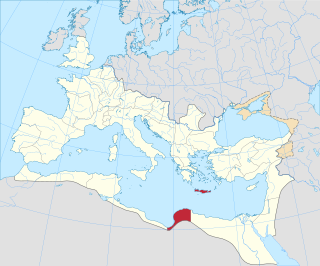Novatianism or Novationism was an early Christian sect devoted to the theologian Novatian that held a strict view that refused readmission to communion of lapsi. The Church of Rome declared the Novatianists heretical following the letters of Saint Cyprian of Carthage and Ambrose wrote against them. Novatianism survived until the 8th century.

Priscilla and Aquila were a first-century Christian missionary married couple described in the New Testament. Aquila is traditionally listed among the Seventy Disciples. They lived, worked, and traveled with the Apostle Paul, who described them as his "fellow workers in Christ Jesus".
Novatian was a scholar, priest, and theologian. He is considered by the Catholic Church to have been an antipope between 251 and 258. Some Greek authors give his name as Novatus, who was an African presbyter.

Pudentiana is a virgin and martyr of the 2nd century who refused to worship the Roman Emperors Marcus Aurelius and Antoninus Pius as deities. She is sometimes locally known as "Potentiana" and is often coupled with her sister, Praxedes the martyr.

June 19 - Eastern Orthodox Church calendar - June 21
Pudens is a Roman cognomen meaning "modest", borne by a number of individuals, including:

Santa Pudenziana is a church of Rome, a basilica built in the 4th century and dedicated to Saint Pudentiana, sister of Praxedes and daughter of Pudens. It is one of the national churches in Rome, associated with Filipinos.

Pudens was an early Christian saint and martyr. He is mentioned as a layman of the Roman Church in 2 Timothy 4:21.

Saint Novatus is an early Christian saint. His feast day is 20 June.
Quintus is a given name and a surname in various languages.

Saint Praxedes, called "a Roman maiden", was a saint and virgin who lived in the Roman Empire during the 2nd century. Along with her sister, Saint Pudentiana, she provided for the poor and gave care and comfort to persecuted Christians and martyrs. Her veneration began in the 4th century and many churches have been dedicated to her.
In the early Christian Church, lapsi were apostates who renounced their faith under persecution by Roman authorities. The term refers to those who have lapsed or fallen away from their faith, only to return to it later.
Quintus Servilius Pudens was a Roman senator active during the second century AD. He was ordinary consul for the year 166 with Lucius Fufidius Pollio as his colleague, and he was proconsular governor of Africa around 180. Pudens is known only through surviving inscriptions.

Crete and Cyrenaica was a senatorial province of the Roman Republic and later the Roman Empire, established in 67 BC, which included the island of Crete and the region of Cyrenaica in modern-day Libya. These areas were settled by Greek colonists from the eighth to sixth centuries BC. After Alexander the Great's death, his short-lived empire was partitioned between his generals during the Wars of the Diadochi. Cyrenaica ended up under Egyptian rule, except for Crete, which remained independent.
The gens Alliena or Aliena was a minor plebeian family of the Roman Republic. The first member of the gens to achieve prominence was Lucius Alienus, plebeian aedile in 454 BC. However, the family then slipped into obscurity for several centuries, emerging once more in the first century BC.
Ceionia Plautia was a Roman noblewoman and is among the lesser known members of the ruling Nerva–Antonine dynasty of the Roman Empire.

Saint Claudia may refer to:
The gens Saliena or Salliena, also written Salena, Sallena, Sallenia, and Sallienia, was a minor plebeian family at ancient Rome. Few members of this gens are mentioned in history, but a number are known from inscriptions.
The gens Trausia was an obscure plebeian family at ancient Rome. Few members of this gens are mentioned in Roman writers, but several are known from inscriptions.
Koiak 11 – Coptic calendar – Koiak 13








